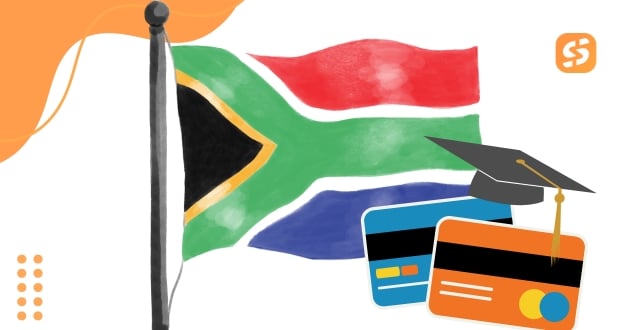Advertisements
Student credit card South Africa is not just another financial product; it is a powerful gateway for young adults stepping into the world of money management. For many students, this is the first official interaction with credit, and it plays a vital role in shaping how they will handle finances for years to come.
By offering lower limits, accessible eligibility, and simplified structures, these cards give learners the chance to embrace financial independence while still being guided by manageable boundaries.
Moreover, the value of a student credit card South Africa goes beyond convenience. It introduces responsibility, creates opportunities to build a credit history early, and provides a safety net in emergencies.
Students can use these cards to pay for essentials like books, transport, or meals, while simultaneously gaining exposure to the habits that lead to long-term financial health. The structure is carefully designed to balance freedom with caution, ensuring that young adults learn discipline without the overwhelming risks associated with high-limit credit cards.
Advertisements
At the same time, the South African financial landscape makes these products even more relevant. With banks competing to attract younger clients, students are presented with diverse offers, each promising unique perks such as fee waivers, discounts, or digital banking tools.
What Exactly Is a Student Credit Card?
A student credit card South Africa is a financial product designed specifically for learners who are just starting their journey into adulthood and money management. Unlike traditional credit cards, which often require stable income and established credit history, student cards have simplified approval processes.
In fact, banks know that most students do not have full-time employment, so they tailor these cards to provide limited access to credit while still offering the key benefits of financial independence.
At the same time, these cards serve as an educational tool. They help students understand how interest works, how repayment schedules affect overall costs, and how important it is to avoid unnecessary debt.
Advertisements
By providing lower credit limits, banks reduce the chances of reckless overspending while encouraging responsible use. Therefore, a student credit card South Africa is not only a payment method, but also a stepping-stone toward a healthier financial future.
Moreover, one of the greatest strengths of these cards is their role in building a credit score. Every purchase and every repayment contributes to a financial profile that lenders will evaluate later in life.
Without this early exposure, young adults often struggle to secure loans or affordable financing once they graduate. In addition, when paired with responsible usage, some student cards can evolve into more advanced products, such as a Low Interest Credit Card South Africa, which offers even better conditions for managing debt and financing bigger goals.
Benefits of Having a Student Credit Card
- Building Credit History Early: One of the most valuable advantages of a student credit card South Africa is the opportunity to establish a credit history. While this may sound like a distant concern to an 18-year-old, the reality is that banks and lenders in the future will look closely at past behavior. By responsibly handling a student card, you lay the foundation for easier access to future loans.
- Convenience and Safety: Cash is becoming less common in South Africa, particularly among the younger generation. Carrying a credit card offers more security and flexibility. If your card is lost or stolen, it can be blocked immediately, unlike cash, which is gone forever. Transitioning to card payments also aligns with global digital trends.
- Rewards and Student Perks: Although rewards programs are usually more generous on premium cards, many banks now include incentives for students too. Discounts on transport, reduced rates for certain subscriptions, or cashback on groceries are some of the benefits that can come with a student credit card South Africa. These small advantages can make everyday spending lighter on the wallet.
- Learning Financial Discipline: Arguably, the most subtle but most impactful benefit is the chance to learn financial responsibility. Using a student credit card requires you to budget, track expenses, and make repayments on time. This creates healthy money habits that will serve you for life.
Potential Risks and Challenges
Of course, every opportunity comes with its challenges. It is vital to acknowledge the risks tied to student credit cards.
First, overspending is a common trap. Because a card gives access to money you do not physically hold, it may create the illusion of having more resources than reality. This can lead to unnecessary debt.
Second, high interest rates apply when payments missed. Although banks may design these cards for beginners, they still treat late payments seriously. Interest can quickly accumulate, turning a small purchase into a long-term burden.
Third, over-reliance on credit can affect mental well-being. Constant pressure to repay debt or fear of running out of money can cause stress. For this reason, experts always recommend spending only what you can repay in full at the end of each month.
How to Qualify for a Student Credit Card in South Africa

Eligibility criteria vary slightly between banks, but the general requirements for a student credit card South Africa include:
- Proof of enrollment at a recognized tertiary institution.
- Minimum age, usually 18 years.
- A valid South African ID or passport for foreign students.
- In some cases, proof of part-time income or a sponsor may be requested.
Transitioning from being a cash-only spender to handling credit responsibly is not complicated, but it requires discipline. Understanding the fine print before applying is crucial. Look for information about fees, interest rates, and repayment terms.
Comparing Different Banks’ Offers
Choosing the right student credit card South Africa often depends on comparing what the major banks provide. Each institution offers different conditions, benefits, and learning opportunities for students. Therefore, understanding these distinctions helps applicants make smarter decisions.
1 – Standard Bank
Standard Bank offers a simple and reliable student card that is especially attractive because it comes with no monthly account fees for full-time students. In addition, cardholders enjoy fraud protection and access to the bank’s highly rated mobile app, which makes tracking expenses and managing payments easier. For those interested, more details are available directly on the Standard Bank website.
2 – Absa
Absa’s approach centered on affordability and education. Their student credit card is designed with minimal entry requirements and often includes access to learning materials about financial responsibility. Moreover, Absa frequently runs promotions with discounts and retail partnerships, making it an appealing option for students who want both savings and guidance. Further information can be found at the official Absa website.
3 – FNB (First National Bank)
FNB focuses on digital convenience and innovation. Its student credit card fully integrated with the FNB mobile app, giving cardholders control over spending, the ability to set limits, and even security features like instant card blocking. Consequently, it is ideal for tech-savvy students who want a seamless online experience. To explore more about their offering, you can visit the FNB website.
4 – Nedbank
Nedbank stands out by encouraging students to build healthy financial habits from the start. Their card can be linked to optional savings accounts, which motivates learners not only to manage spending but also to set money aside. As a result, students gain a more balanced financial education. For comprehensive details, check the Nedbank website.
Strategies for Responsible Usage
First, always pay your balance on time. This avoids interest and late fees while boosting your credit score. Second, keep your spending within 30% of the credit limit. This ratio, known as utilization, heavily influences your credit rating. Third, review your monthly statements. Monitoring your activity prevents fraud and helps you understand where your money goes.
Moreover, try linking your card to a budgeting app. Modern tools provide visual charts that highlight spending categories. By seeing how much you spend on food, transport, or leisure, you can adjust habits accordingly.
The Bigger Picture: Credit Education in South Africa
A student credit card South Africa is not just about swiping at the checkout counter. It is part of a broader picture of financial literacy. In a country with significant income inequality, understanding credit is vital for future economic stability.
Many students are first-generation university attendees. They may lack parental guidance in financial matters. Banks and universities therefore share responsibility to provide accessible education about credit, debt, and saving. Workshops, online tutorials, and on-campus support can empower young adults to make informed decisions.
Conclusion
Ultimately, a student credit card South Africa is much more than a plastic card. It represents independence, responsibility, and the beginning of a lifelong relationship with the financial system. Used wisely, it becomes a tool that opens doors to future opportunities, from car ownership to housing finance.
However, without discipline, the same tool can lead to stress and unnecessary debt. The choice is yours. Approach credit with respect, make payments consistently, and treat your card as a stepping-stone rather than free money.
In conclusion, navigating student life involves managing academics, social commitments, and personal finances. A student card can support this journey when handled wisely. With knowledge, discipline, and the right bank partner, South African students can turn credit into an empowering tool for success.



















